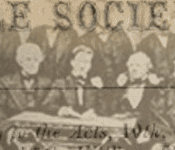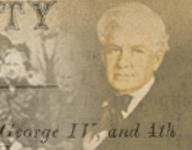 |
 |
 |
| Beans,
Gas, & Ben Franklin |
| In almost nine decades since its formation, the IAA, or Illinois Farm Bureau has seen many successes. It carries a respected voice to Springfield, Washington, D.C., and around the globe. It provides an increased number of services to its growing membership base, while its affiliated companies are among the nation’s largest and most profitable. So whether it is the marketing of corn, soybeans, or other agricultural commodities; providing affordable fire insurance to farmers; or the development, sale, and promotion of renewable fuels such as ethanol or bio-diesel, the IAA and its family of companies have played a key role in the success of the American and Illinois agricultural industry. So let’s salute the forefathers of the IAA and its family of companies, Ben Franklin, and 28 cotton weavers in England. Now I know what you are asking yourself: “How do Ben Franklin and some cotton weavers from England fit into the picture?” Actually, our story could go much further back in history. Even from the earliest records of civilization, people have worked together to accomplish tasks they could not accomplish on their own. Even the Pilgrims worked together in settling the new world. They jointly cleared the land, planted the fields, and shared its bounty. But for our story, let’s stick to more recent history. |
| In 1736, the threat of fire was great in the early metropolises of the day. The city of Philadelphia was no exception. The wooden houses, lined up side by side, posed a great threat. A thirty year old Benjamin Franklin was intrigued with this threat, along with its prevention. So much so that in 1736 he helped to initiate the Union Fire Company as an organized volunteer fire company. During the next few years, eight volunteer fire companies were started in Philadelphia. On the flip side, Franklin also realized that even though the fire companies would help prevent fires from spreading, fires could still devastate a neighborhood. So in 1752, Franklin gathered a group of citizens in Philadelphia to address the need of protection against fire for home owners. Franklin, along with his fellow Philadelphians organized the first mutual insurance company in the Americas for the purpose of insuring the members’ property against fire. The Philadelphia Contributionship was so successful, it is still in operation today. Franklin is given the credit of bringing the philosophy of cooperatives to America. He has even been labeled the Father of American Cooperatives. |
|
| Throughout the decades following the American Revolution, the agricultural industry began to embrace cooperatives. Ag cooperatives began to spring up in the New England states in the early 1800s with the first dairy cooperative in Goshen, Connecticut, and the first cheese dairy cooperative in South Trenton, New Jersey. As the American population worked its way westward, so did cooperatives. In 1820, the first hog marketing, slaughtering and packing cooperative, the Licking Exporting Company, was started in Granville, OH. The cooperative spirit was starting to make its mark on American agriculture, but it wasn’t until 1844 that cooperatives were about to change American agriculture forever. In Rochdale, England, 28 weavers working at the local cotton mill met to discuss their low wages and the fact that they had difficulty affording household goods. After years of struggling, they developed what they believed to be an equitable plan. They would pool their resources and open their own store. Following discussions among the weavers, they formed the Rochdale Equitable Pioneers Society. |
| The organizers worked to gather enough funds from its members. Once done, they opened a small cooperative store selling only flour, oatmeal, sugar, and butter. Throughout the development, the members worried that their enterprise would fail. The rent was high, and they could only afford to keep the store open two nights a week. Within three months of its opening, however, success of the store had grown enough to be opened five nights a week. The society members where committed to the success of their endeavor, but wanted to be sure of the democratic operation of the cooperative. They developed a core list of principles by which their cooperative would be operated. The Rochdale Principles, as they became known, demonstrated to others throughout England that cooperatives can work. By 1900, more than 1.7 million people throughout England were owner/members of purchasing cooperatives. Individually, the principles the Rochdale Pioneers developed were not new. However, when they put these individual policies together for their new cooperative, it not only developed a formula for the success of their endeavor, but helped to shape future cooperatives throughout England, Europe, and the United States. The Rochdale Principles initial use within the agricultural community in the U.S. was in the late 1800s by the Patrons of Husbandry, better known as the GRANGE. In 1874, a representative of the GRANGE traveled to Europe to learn about their cooperatives. Then in 1875, they published a set of guidelines to set up cooperative stores based on the Rochdale Principles. During the next several decades, thousands of agricultural cooperatives were created. Many survived, and many failed, but the lessons learned and the belief in the Rochdale Principles lived on. |
|
| So what do these Principles have to do with the formation of the IAA and Farm Bureau in Illinois? In many ways, the basics of the Rochdale Principles apply to the structure of the IAA and its family of companies. Throughout the years the twelve initial Rochdale Principles have been simplified to seven. By looking at these cooperative Principles, we can see how they relate, not only to cooperatives, but the IAA as well. The Rochdale Pioneers, in an effort for their cooperative to grow and prosper, began their Principles with the concept of “voluntary and open membership.” They wanted everyone who desired to be part of the cooperative to have the opportunity to do so. This principle is one that was embraced by the organizers of the Soil Improvement Associations in Illinois (the predecessors of the current IAA). From the beginning, community leaders throughout the state understood the importance of a strong agricultural industry. This idea was crystallized when on January 15, 1912, three separate organizations, the DeKalb County Farmers’ Institute, the DeKalb County Banker’s Association, and the DeKalb County Newspapermen’s Association decided to merge into the state’s first Soil Improvement Association. Even today, people from all walks of life join their county and Illinois Farm Bureaus because they believe in the organization and its purposes as is stated in the opening paragraph of the application and membership agreement:
The second Rochdale principle addressed the fear those early trailblazers from Rochdale had that their new endeavor might become controlled by only a few. They wanted to guarantee that everyone had voice in the decisions of their cooperative. For this reason, they established the policy that would ensure that their cooperative would be “operated in a democratic fashion.” One of the true strengths of the Illinois Farm Bureau is its grassroots structure. Through the county organizations and their democratically elected leaders, the views of the members are forwarded and acted on by the delegates to the state annual meeting. But it doesn’t stop there. It is the power of involvement and the voice of the individual member that makes Illinois Farm Bureau a force to be reckoned with. |
| In 1933, Illinois Farm Bureau asked the federal government to allow all farmers to use stored corn as collateral for loans. Through the efforts of the individual elected county Farm Bureau presidents, on a call by then IAA President Earl Smith, 8000 Illinois Farm Bureau members came to Peoria to rally the cause. Speaker of the House of Representatives, Henry T. Rainey of Carrollton, addressed the crowd by saying “I have never, in all of my experience as a public speaker, addressed a more thoughtful, earnest, large audience than this . . .” Quoting John Lacey, author of the book Farm Bureau in Illinois “The crowd didn’t realize it at the time, but the fact is that the fate of the proposed corn loan was decided by what went on at Peoria.” The loan program was approved at 45 cents per bushel. Whether it is buying stock, patronizing the cooperative, or volunteering to serve on a committee or board, the rise and fall of any cooperative or association lies in the “participation of its members/owners”…the third principle. |
|
| The Illinois Farm Bureau and its family of companies is no exception. Members have always stepped up when the need arose. An example of this came at the 1919 Annual Meeting of a then-fledgling IAA. Previously, each county organization paid annual dues of $100. It was obvious that if the organization was to meet the challenges facing the Illinois farmers, a better financed organization was needed. Going into the Annual Meeting, delegates knew the call was coming for each individual member to pay annual dues of $5. Many of these county delegates had been instructed to vote against the dues plan. After much debate a call was made for delegates to make a three year pledge of $100 annually to help fund the organization until an adequate dues structure could be implemented. Following much hesitation, a delegate from Jersey County, Charles E. Lock, stepped forwarded and said “I’ve got three boys, one of whom is in France, and I want to give them a chance to be Illinois farmers. I want to be the first man to subscribe $100 to the fund to make possible this big association to stand for farmers’ interest.” After his bold comments, 100 delegates signed pledge cards giving the IAA the financial backing to obtain operating loans until the $5 membership dues began to arrive. Whether the need was for time or money, Illinois Farm Bureau members met the challenge. Every year, delegates from the county Farm Bureaus gather at the IAA Annual Meeting to discuss issues and to vote on resolutions to help direct the organization for the upcoming year. The policies passed might be local, state, or national in nature. The job is then turned over to the IAA to help implement these policies. A challenge facing the IAA in meeting this task is the barrage of constituents and lobbyists approaching elected officials in Springfield and Washington, D.C. from different organizations, each with a variety of agendas. It only makes sense that if the different agricultural groups cooperated on the common issues, their influence would be greatly increased. For this reason, the IAA began The Agricultural Legislative Roundtable in the early 1980s. This group meets annually to review the priorities of each organization and tries to develop a unified front on important issues. Although the groups involved in the Agricultural Legislative Roundtable come to a consensus on a variety of issues, there are still others where they have opposing views. On these issues, the groups agree to disagree and target these issues independently. So although the IAA may enter into agreements with other groups, it maintains its autonomy. “Autonomy and Independence” is the fourth Rochdale Principle. One of my favorite quotes is “Knowledge is Power!” The Pioneers knew if their members were to invest and take an active part in their cooperative, members and their employees needed to understand the purpose, structure, and operation of the business. Even back when the Soil Improvement Associations were being developed, the leaders of the day knew of the importance of the fifth principle: "Education, training, and information." They pioneered the system of hiring county soil specialists, the forerunners of the county extension farm advisors. Of course, today, with so much information and misinformation available, it is more important than ever that the IAA and its family of companies get their message out. And what is the message? |
|
| If the subject deals with improving net farm income, the quality of life, or furthering the goals of the organization, the IAA and its family of companies have a vested interest in providing training, education, and information to its members. "The cooperation among cooperatives" is the sixth Rochdale Principle. Sometimes the need arises for cooperatives, or in the case of the county soil improvement associations, to join forces to strengthen service to members, as was the case with the formation of the IAA. Following the creation of the Soil Improvement Associations, it became obvious in 1915 that for all of the successes of the local associations, the associations would need to join forces to face state legislative challenges, and for the mutual benefit of purchasing limestone and rock phosphate. A special invitation was sent to farmers from the different associations to attend the January 26, 1916, meeting of the Illinois Association of County Agriculturalists. Following the normal business of the meeting, the group held a discussion on a statewide organization of farmers. A study committee was appointed to review the concept and report back later that evening. The committee presented their report and the name “Illinois Agricultural Association” was adopted with annual dues set at $100 per county association. Herman Danforth of Tazewell County was elected President, and Howard Leonard of Woodford County was elected secretary. The rest, as they say, is history. The last of the Principles that the Pioneers adopted was “concern for their community.” They realized that no matter how much the cooperative benefited their members, if their community was not prosperous, neither would be their quality of life. |
| During the floods of 1993, many Illinois residents, farms, and communities were devastated as the waters of the Illinois and Mississippi Rivers overran their banks. According to Lee Larson, Chief of the Hydrologic Research Laboratory of NOAA/National Weather Service, “Significant rainfall in June and July in the Upper Midwest, combined with wet soil conditions, was the cause of severe flooding in the Upper Mississippi River basin. In mid-June, eight inches of precipitation fell across the Upper Midwest. This resulted in flooding on rivers in Minnesota and Wisconsin and eventually pushed the Mississippi River to a crest at St. Louis on July 12th of about 43 feet, equaling the previous stage of record.” The rain in the upper Midwest continued throughout July, pushing the flood crest in St. Louis to the even higher record of 49.47 feet on August 1. These waters, not only devastated those living and farming along the Mississippi, but also along its main arteries, including the Illinois River. |
 1993 Flood at Grafton |
| County Farm Bureau members throughout Illinois came to the assistance of their fellow members and citizens. Many county Farm Bureaus, including Edgar, Coles, Cook, and Champaign, collected needed flood relief donations from their members and local communities. Other counties, including McLean, McDonough, and Macon sponsored bus trips for volunteers to assist with sandbagging efforts in Pike and other affected counties. Counties also provided office space for displaced businesses, the media, and for the warehousing of relief supplies. So whether it is fighting a devastating flood, working to establish ambulance or 911 services, defeating local backdoor referendums, or helping to raise money for local initiatives, county Farm Bureaus throughout Illinois work to meet the challenges facing their local communities. The history of the Illinois and county Farm Bureau does not begin just with the formation of the county Soil Improvement Associations in 1912 or even in 1916 with the formation of the IAA. But rather, the true beginning of the IAA dates back hundreds of years when farmers and others realized that by working together, greater things could be accomplished. The knowledge of working together was passed down from generation to generation, each improving on the knowledge and experiences of their parents and grandparents. From the days of the Pilgrims and the Mayflower compact, Ben Franklin and his Philadelphia Contributionship, the Rochdale Pioneers and their foundation-setting principles, and the early agricultural cooperatives, the early founders of the IAA and the county Farm Bureaus used this knowledge to lay the groundwork of the organization we know today. Just as these founders set the cornerstone of the IAA and county organizations, the following generations built on the foundation to address the needs of agriculture and its members through the development of the various local and then statewide affiliated companies. Whether the need was insuring farms and homes; marketing corn, beans, milk, or value added products like ethanol or bio-diesel; group purchasing of production inputs; or just providing auditing or financial services, the local and state based affiliates were created in the cooperative manner and with the knowledge and experiences of the past. So what does the future hold? No one can tell, but one thing is certain: if we follow in the path of our agricultural and cooperative forefathers, and keep in mind the spirit of cooperation, the IAA and the county Farm Bureaus can meet the challenges of the future. |